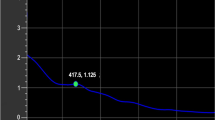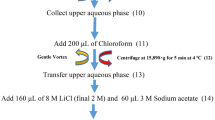Abstract
THE presence of a saponin in the seeds of Trigonella Foenum græcum (Leguminosæ) was first reported by Wunschendorff1, who had subjected the defatted seeds to a process of extraction with alcohol. He obtained from the alcoholic extract a gelatinous precipitate which was afterwards dissolved in alcohol and reprecipitated with ether. Wunschendorff described the product so obtained as a white semicrystalline powder, m.p. 214–215°, which gave a yellow colour test with concentrated sulphuric acid, and a white precipitate with barium hydroxide solution. However, he could not assign a definite formula to the saponin, but showed that it gives by hydrolysis a reducing sugar and water-insoluble sapogenin.
This is a preview of subscription content, access via your institution
Access options
Subscribe to this journal
Receive 51 print issues and online access
$199.00 per year
only $3.90 per issue
Buy this article
- Purchase on Springer Link
- Instant access to full article PDF
Prices may be subject to local taxes which are calculated during checkout
Similar content being viewed by others
References
J. de Pharm. et. de Chim., 20, 183 (1919).
Author information
Authors and Affiliations
Rights and permissions
About this article
Cite this article
SOLIMAN, G., MUSTAFA, Z. The Saponin of Fenugreek Seeds. Nature 151, 195–196 (1943). https://doi.org/10.1038/151195b0
Issue Date:
DOI: https://doi.org/10.1038/151195b0
This article is cited by
Comments
By submitting a comment you agree to abide by our Terms and Community Guidelines. If you find something abusive or that does not comply with our terms or guidelines please flag it as inappropriate.



